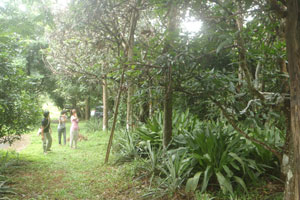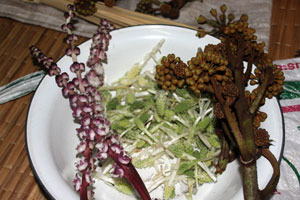While there are examples of practices that successfully support biodiversity in agriculture, and even good international agreements, these practices are not spreading far and wide. There seem to be invisible walls, ceilings and floors that limit the spread of sustainable agro-biodiverse practices and their adoption into mainstream policies, practice and culture. What is stopping us from opening the doors and windows of this “glass house”?

From organic farmers in our network I had learned the value of using land close to the house, or as they call it, the “supermarket behind my house”. At that time, I was professionally supporting organic farming and its benefits. If I could start from one of the worst situations and get to a wonderful fertile farm – this would be a good story to tell.
My first significant act was to cover the soil with the rice straw that many people in our area burn after harvesting. This and this alone was enough to change the conditions drastically.
A few months later, the soil was softer, moister and there was more life. Weeds started to appear where before there were none. At first, I didn’t like the dominant weed growing, but then I observed that its roots had many nitrogen-providing rhizobium nodules and the plant was basically an effective soil cover. I realised that this plant, which I didn’t plant at all, was doing quite a lot for my soil and my garden. I could go on describing other steps, but that is a longer story. My experience shows that even if we do very little we can still help nature along in the right direction in a big way.
In my ten years of supporting organic agriculture, I have seen many successful examples where farmers have revitalised their soil and environment and are producing better quality crops. Initially organic farming is more work, but once nature takes over and the soil and agro-ecology work their magic, there is very little a farmer needs to do besides being present, learning from the farm, and occasionally doing some tweaking.
Why is not everyone doing it?

I see a global set of norms that appear to go against the practices and principles that support biodiversity, making it even more difficult for people to change their ways. Even though there are other reasons that biodiverse forms of agriculture are not taking off, for me the invisible barrier of the “glass house” is present in these cultural and social norms that influence how we see and act in the world, largely unconsciously.
Norms and barriers
A first such norm is the emphasis on a very structured and organised cleanliness that has emerged. It also is referred to as “sanitary”, meaning free from any sort of insects, animals (aside from pets), and micro-organisms. Weedicides, fungicides, pesticides, GMO varieties: they all work in this direction. If a biodiverse “jungle” in someone’s garden or farm is considered bad and a sterile orderly environment is good, we will have an inherent adversity to biodiversity.
A second norm is an expectation of instant results. Let’s take the example of pesticides for instance, or in the Thai language, “insect killing medicine”. Someone who expects and appreciates quick results may not be impressed with slower acting herbal pesticides, let alone with helping a healthy ecosystem to re-establish a balance.
Thirdly, there seems to be a loss of value and respect for one’s own knowledge and responsibility, and an increase in value and respect for knowledge from outside “experts” and recognised authorities. If some sort of accreditation or label establishes that GM foods or a small amount of pesticide residue is safe to eat, it is good enough. On the other hand, many question whether using aged manure as fertilizer is safe – even though this fertilizer has been used longer than anything else. Rather than to depend only on the global knowledge of “experts”, the traditional and cultural knowledge passed on by one’s ancestors can be a great starting point, as is exchanging knowledge with one’s neighbours.
I have also observed a norm of increasing specialisation in response to globalised trade networks. The dominant mantra is that the secret to success is to specialise, producing one thing very efficiently for the global market. Taken to its maximum this may lead to areas that are not only free of agricultural biodiversity but to huge agro-bio-uniform industrial plantations that are free of small-scale farmers as well.
Finally, there is the mantra of money. While it is recognised by most that there are universal goods, like peace, biodiversity and environmental health, these goods do not show on one’s balance sheet of growth until they generate dollars. With such a mantra of money, agro-biodiversity is only likely to receive more general support when it can be shown to support economic development. This really limits the number of options and paths to take.
How to change such norms?
My only idea is to expose others to alternatives and new interpretations. This is effectively what pioneering organic farmers have done. While changing societal norms does not normally come quickly or easily, this process may also be fun. I see this with many of my organic farmer friends.
Having continued and succeeded in spite of many telling them that they were crazy, they no longer fear failure, and thus they get to play and experiment and learn every day. I look forward to seeing new manifestations of agrobiodiversity, such as “agrobiodiversity meets shopping centre” or “agrobiodiversity meets parking lot”. These may sound like crazy concepts now but this could just be the limitation of our imagination.
Michael B. Commons
Michael B. Commons lives in Thailand and works for the Earth Net Foundation.
E-mail: michael@greennet.or.th

